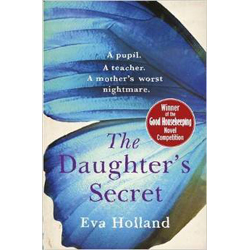 Published: 2015
Published: 2015
Author: Eva Holland
Great writing – but unsympathetic characters

Every now and then a story pops up in the press about a teacher who has had an affair with a pupil and is (rightly) jailed for their abuse of trust. Less often the papers fall over themselves with puritanical excitement when a teacher and pupil actually run away together – of course it’s dreadful, but for a few days it becomes the biggest story in the country. There’s a little flurry of excitement again around about the time of the trial but for the most part the stories are forgotten and the families are left to return to some semblance of normality. Eva Holland’s debut novel, The Daughter’s Secret, is the story of one mother trying to come to terms with the coming release of her daughter’s teacher from prison.
Rosalind Simm lives the almost perfect middle class life with her family in St Albans but this is shattered when her fifteen year old daughter Stephanie disappears after school one day. There are no clues as to why Stephanie has chosen to leave until an anonymous tip suggests that she is with geography teacher Nathan Temperley. Six years later the imminent release of Temperley sends the Simms’ world into turmoil once again.
Eva Holland won Good Housekeeping’s 2014 Novel Writing competition and it’s not hard to see why. The writing is excellent and the concept intriguing with a story that ‘s recognisable enough not to have to spend too much time working it out but fresh enough not just to feel like a rehash of news stories. The use of two timelines works well and helps to develop the story and (some of) the characters, particularly Ros.
As always when I have reservations with a well-written, interesting book the issue is with my connection to the characters. In all honesty, I had none whatsoever and that meant that no matter how well-paced the book was I just didn’t have that compulsion to pick it up. Even before Stephanie’s abduction/running away, Ros was paranoid about something bad happening to her children. She would take them off school coaches or stop them leaving her sight because she imagined wheels flying off buses or luggage falling from aeroplanes. While I felt a degree of sympathy for Ros suffering from such debilitating anxiety, she seemed to do nothing to help herself seeming happy to inflict her fears on her children. It wasn’t easy to accept that Ros’s husband was willing to ship his daughter off to a clinic for alcoholism treatment after knowledge of one binge-drinking session but was willing to allow Ros’s illness to affect the entire family without urging her to seek help.
Both Ros and Stephanie seem to spend the entire book lying to each other, the rest of the family and their friends. By not knowing how trustworthy the characters were it made it difficult to feel empathy for their situation. Dan, the husband and father, is also keeping his own secrets and is coping with the situation in his own way which isn’t helpful to the rest of the family. The most underwritten character is son Freddy, who seems to be the one character that I would actually want to spend time getting to know.
I also found the end quite disappointing, although I know other reviewers have held the exact opposite view. For a book that was rooted in a sense of reality, this was too much of a stretch for me.
I always feel very torn when I’ve enjoyed the writing and plot of a book, but my connection to a story very much relies on my empathy for the characters and I just didn’t have that feeling here.
